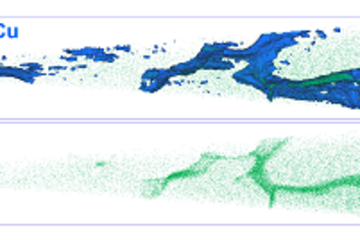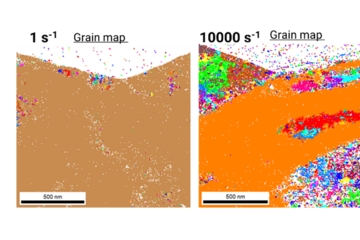All genres
81.
Talk
Theory-guided design of Ti-based binaries for human implants. Euromat 2007, Nürnberg, Germany (2007)
82.
Talk
Theory-guided design of Ti-binaries for human implants. XVI. International Materials Research Congress, Cancun (Merrida), Mexico (2007)
83.
Talk
Ab initio prediction of elastic and thermodynamic properties of metals. Seminar in Friedrich-Alexander-Universitaet, Erlangen-Nürnberg, Germany (2007)
84.
Poster
Atomistic and inverse-analytical modeling of elastic properties of coherent nano-phases. GDRi CNRS MECANO General Meeting on the Mechanics of Nano-Objects, MPIE, Düsseldorf, Germany (2013)
85.
Poster
Quantum-mechanics-based study of multi-scale elastic properties of hierarchical biocomposites. Prospects of bionics for functional Materials Science, Montan University Leoben, Leoben, Austria (2010)
86.
Poster
Ab initio based study of multi-scale elastic properties of hierarchical biocomposites. Psi_k Conference 2010, Berlin, Germany (2010)
87.
Poster
Arthropod cuticle: A biological multi-functional composite used as template for nano-to-macro-scale hierarchical modeling. Materials Science and Engineering 2010, Darmstadt, Germany (2010)
88.
Poster
Theory-guided design of Ti–Nb alloys for biomedical applications. 1st International Conference on Material Modelling, Dortmund, Germany (2009)
89.
Poster
Hierarchical modeling of the mechanical properties of lobster cuticle from nano‐ up to macroscale: The influence of the mineral content and the microstructure. 4th International Conference on Multiscale Materials Modeling, Tallahassee, FL, USA (2008)
90.
Poster
Novel multi-descriptive approach to crystal plasticity of textured beta-Ti alloys. Deutschen Physikalischen Gesellschaft (DPG) Annual Meeting 2008, Berlin, Germany (2008)
91.
Poster
Bottom up design of novel titanium-based biomaterials through the combination of ab-initio simulations and experimental methods. Euromat 2007, Nürnberg, Germany (2007)
92.
Poster
Effects of initial orientation, sample geometry and friction on anisotropy and crystallographic orientation changes in single crystal microcompression deformation: A crystal plasticity finite element study. International workshop on small scale plasticity, Brauwald, Switzerland (2007)
93.
Poster
Theory-guided design of Ti-binaries for human implants. "Theory Meets Industry" workshop, Vienna, Austria (2007)
94.
Teaching
Pre-course on Linux and Matlab (Block Lecture) (PrepLinux). Lecture: Vorlesung & Übung, WS 2021/2022, 1SWS, FAU Erlangen-Nürnberg, October 01, 2021 - March 31, 2022
95.
Teaching
Ab-initio based multi-scale approaches to the elasticity of metallic polycrystals and hierarchical biocomposites. Lecture: XI National Congress on Theoretical and Applied Mechanics, Borovets, Bulgaria, September 02, 2009 - September 05, 2009
96.
Teaching
Understanding the Elasto-Plasticity of Crystals. Lecture: MMM- Max-Planck Multiscale Simulation Conference, St. Feliu de Guixols [Spain], October 30, 2007
97.
Teaching
1) Design of new Ti-based biomaterials by using ab-initio simulations, FEM, and experiments 2) Detailed analysis of an indent. Lecture: AICES – MIT conference, RWTH Aachen, Germany, October 08, 2007
98.
Thesis - PhD
First-principles investigations of solid solution strengthening in Al alloys. Dissertation, RWTH Aachen, Aachen, Germany (2011)
99.
Report
Ab-initio simulation and experimental validation of beta-titanium alloys. (2008)











